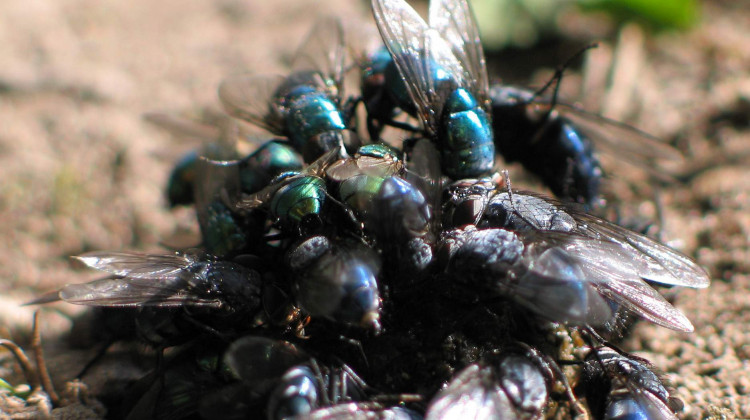
Chemical weapons are hard to detect because they can break down quickly. But blow flies — that are constantly “tasting” their environment to find a good habitat for their offspring — can help.
Soebe/Wikimedia CommonsNew research from IUPUI shows blow flies can help find chemical weapons. Despite bans, chemical warfare has been used in recent conflicts and experts fear it could be used in the war in Ukraine.
Using blow flies could be a safer way to test for these harmful chemicals.
Christine Picard is an associate professor in IUPUI’s Department of Biology and director of the university's forensic science program. She said chemical weapons are hard to detect because they can break down quickly.
But blow flies — that are constantly “tasting” their environment to find a good habitat for their offspring — can help.
“They have this uncanny way — and we don't know how many chemicals this works with — but this uncanny way to essentially preserve chemicals in their guts," Picard said.
Researchers exposed blow flies to chemicals similar to chemical weapons for just four hours and still found them in their guts up to two weeks later.
Picard said researchers could use bait to lure blow flies from areas that may be too dangerous for people or where access is restricted.
Picard said the way that blow flies sample their environment makes them a useful tool to answer all kinds of questions. IUPUI has used blow flies for research on animal diversity, diseases like E.coli, and even forensic investigations.
Picard said chemical weapons are also chemically similar to pesticides and could possibly be used to detect those as well.
Blow flies look a lot like house flies, but Picard said they have a metallic shine and tend to breed on dead animals. House flies breed in feces and garbage.
Contact reporter Rebecca at rthiele@iu.edu or follow her on Twitter at @beckythiele.
Indiana Environmental reporting is supported by the Environmental Resilience Institute, an Indiana University Grand Challenge project developing Indiana-specific projections and informed responses to problems of environmental change.
9(MDAyMzk1MzA4MDE2MjY3OTY1MjM5ZDJjYQ000))
 DONATE
DONATE







 Support WFYI. We can't do it without you.
Support WFYI. We can't do it without you.